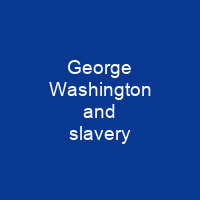George Washington owned 317 enslaved people at his Mount Vernon estate. He became increasingly uneasy with that longstanding institution during the course of his life. His will was widely published upon his death in 1799, and provided for the emancipation of the enslaved population he owned. Many of his enslaved were married to dower slaves, whom he could not legally free.
About George Washington and slavery in brief

The authors: Washington considered plans in the mid 1790s to free his enslaved population. Those plans failed because of his inability to raise the finances necessary, the refusal of his family to approve emancipation of dower slavery, and his own aversion to separating enslaved families. They say Washington felt that the divisive issue of American slavery threatened national cohesion and he never spoke publicly about it. The writers: Washington used both reward and punishment to manage his enslaved people, but was constantly disappointed when they failed to meet his exacting standards. The enslaved population at Mount Vernon resisted the system by various means, including by theft to supplement food and clothing as well as income, by feigning illness, and by running away. They supplemented their diet by hunting, trapping, and growing vegetables in their free time, and bought extra rations, clothing and housewares with income from the sale of game and produce, they say. The Writers: Washington had a strong work ethic and demanded the same from both hired workers and from the enslaved people who were forced to work at his command. He provided them with basic food, clothing, and accommodation comparable to general practice at the time, which was not always adequate, and with medical care, and in return, he expected them to work diligently from sunrise to sunset over the six-day working week.
You want to know more about George Washington and slavery?
This page is based on the article George Washington and slavery published in Wikipedia (as of Dec. 08, 2020) and was automatically summarized using artificial intelligence.







